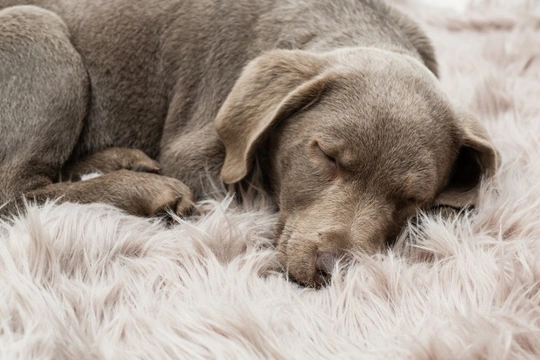
What should you do if your dog has a nightmare?
Witnessing another person such as your partner or child having a nightmare can be very distressing, and it can of course be hard to know how to react in such a situation. Often, our instinctive response is to shake the person awake and end the nightmare, but received wisdom today indicates that this may be the worst thing to do, and that you should in fact leave them them to sleep and work through the nightmare. However, if the person in question is thrashing about and acting out their nightmare or even sleepwalking, the right thing to do becomes a lot harder to ascertain.
When it comes to dogs and their dreams, dogs can have nightmares too-and this can be just as distressing as watching someone else that we love suffering through something when we have the power to wake them up and end it. Dogs are of course significantly different to people in terms of their natural behaviours, thought processes, instincts and emotions-and this can mean knowing how to deal with canine nightmares can be even harder.
In this article, we will look at dogs’ nightmares and how they present in more detail, and look at some potential options of what to do if your dog has a nightmare, and how to reduce nightmares too. Read on to learn more.
Dogs and dreams
Like all mammals, dogs dream, and go through REM sleep and various other stages while at rest. Even if your dog is sleeping peacefully and not moving or making any sound, they may well be dreaming-or even having a nightmare, without you realising it.
This is because sleep is a whole process that works in cycles, and as dogs descend down into the deeper layers of sleep that take them through to the dreaming stage, their bodies enter a natural state of light paralysis, which keeps them from getting up and acting out their dreams. This happens for people too, and is why sleepwalking and other particularly vigorous or directed actions in our sleep are unusual, regardless of what we are dreaming about.
However, this light paralysis is neither absolute nor fool proof, and the more vivid or active a dream is, the more likely it is that your dog will show some signs of movement. This may be restricted to the occasional twitch or vocalisation, but some dogs will be very restless when dreaming, potentially even furiously peddling their legs while asleep if they are running in their dreamscape!
Identifying a nightmare
You will never know for sure of course what your dog is actually dreaming about, because they cannot tell you-and even if your dog’s movements and vocalisations are pronounced, it can be hard to definitively identify a nightmare.
“Running” in a dream, yelping or other activities that are apt to get our attention do not necessarily indicate a bad dream-your dog might be running around having fun, or yelping in frustration at a just-out-of-reach rabbit in their dream, after all! Dreams of this type are very common in dogs that have a strong prey drive and/or that are very active, such as the Border collie.
For dogs that sleep very quietly, you will be highly unlikely to ever know if they are having a good dream or a bad one, or even when they are dreaming at all!
However, if your dog is crying in their sleep, shaking, or displaying other acute signs of distress, or if they wake up suddenly and appear fearful, upset and disoriented, or take a while to settle back down, they may be having, or have just had, a nightmare.
What should you do if your dog has a nightmare?
If you see your dog in the throes of what you are sure is a terrifying nightmare, you have probably found yourself on your feet and about to wake your dog up before you have really thought it through.
However, this is not a good idea for a range of reasons-interrupting your dog from REM sleep, even if they are having a bad dream, will interfere with their sleeping patterns and potentially, deprive them from getting what they need due to this outside interference.
Additionally, waking your dog suddenly from a nightmare may be dangerous, because your dog will be disoriented and take a while to adjust, and if in their head they have been fighting a dragon and you are physically shaking them or otherwise very close by, they may well lash out or snap when they do awake.
Try to let your dog’s nightmare run its course, and keep a note of how often your dog is apt to have nightmares if possible too. Talking to your dog in a calm, reassuring and everyday voice while they are going through a nightmare may help to change the direction of their dream, or bring them up from the deepest stage of sleep just enough to turn the dream into something else.
If you do need to wake your dog up from sleep, try saying or calling their name in the way that you would normally, as being spoken to by name filters through the consciousness of both dogs and people, even when asleep.
Additionally, if your dog has nightmares regularly, try to ensure that your dog’s living situation is stable, has a regular routine, and fulfils all of their needs-a dog that is stressed or that feel insecure when awake will be more likely to have bad dreams when asleep.



